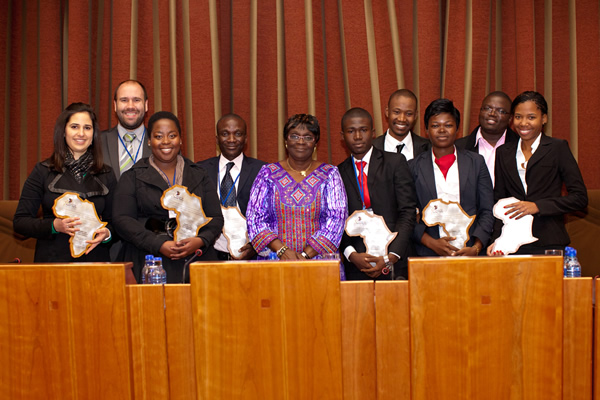The combined team from the University of Pretoria, the University of Botswana and Université de Cocody (Côte d’Ivoire) emerged as the winner at the 20th African Human Rights Moot Court Competition final in Pretoria yesterday.
The final of the Competition was held at the Conference Hall of the SA Reserve Bank in Pretoria. It was adjudicated by five members of the African Commission on Human and Peoples’ Rights, including the Chairperson, Advocate Reine Alapini Gansou, the Deputy Chairperson Mr. Mumba Malila, as well as South Africa’s Advocate Pansy Tlakula, who is also the Commission’s Special Rapporteur on Freedom of Expression.
The Moot Court is an annual mock trial competition between African law faculties, organised by the University of Pretoria’s Centre for Human Rights. It is the largest annual gathering of law students and lecturers on the continent. Fifty-three university teams from twenty-two African countries were in Pretoria for this year’s competition.
The hypothetical cases argued involve burning contemporary human rights issues affecting African countries. This year, participants argued whether a hypothetical African government, Dosmoon, has contravened the African Charter or other international laws by relocating an indigenous group from the land which they traditionally occupied, and granting a coltan exploitation license over that land to a mining company that is co-owned by the government. The case was brought before the African Court by a hypothetical civil society organisation, Environment For Life (EFL).
Speaking after the Final Round, Advocate Gansou lauded the participants for their mastery of human rights issues and their fearless submissions before the judges.
“My hope is that you will go on to become top human rights advocates and give a voice to the African Charter and other African human rights instruments. Being a human rights advocate is not about creating wealth, but about defending the voiceless, and listening to you today, I have no doubt about your passion and your aptitude to do just that,” she said.
This year’s Moot coincided with the 25th anniversary of the Centre for Human Rights and the 30th anniversary of the adoption of the African Charter.
Six teams qualified for the finals, two of them French-speaking. The University of Ghana, Moi University (Kenya) and Unversité Gaston-Berger de Saint-Louis (Senegal) argued for the applicant, while the Universities of Pretoria and Botswana were joined by Université de Cocody (Côte d’Ivoire), to argue for the respondent.
“The Moot aims to expose a new generation of lawyers to the tangible benefits of peacefully conflict through judicial means,” said Frans Viljoen, Director of the Centre for Human Rights.
“As you enjoy the privilege of the anniversary competition I challenge you, as future African human rights professionals, to become bearers of ubuntu – the essence of being human - as Africa’s gift to the world.,” Archbishop Emeritus Desmond Tutu said in a special letter addressed to the particpants.
![]() Download a copy of Archbishop Emeritus Desmond Tutu's letter
Download a copy of Archbishop Emeritus Desmond Tutu's letter
The Moot Court was organised by the Centre for Human Rights, in collaboration with the African Commission, and with the financial and material support of the European Union, the Embassy of the Federal Republic of Germany, the John D. and Catherine T. MacArthur Foundation, the University of South Africa, Juta Law Publishers, and the University of Pretoria.
